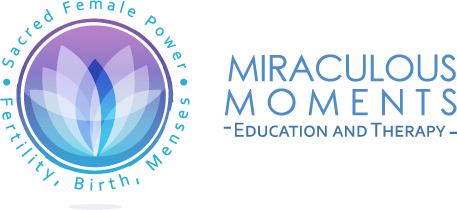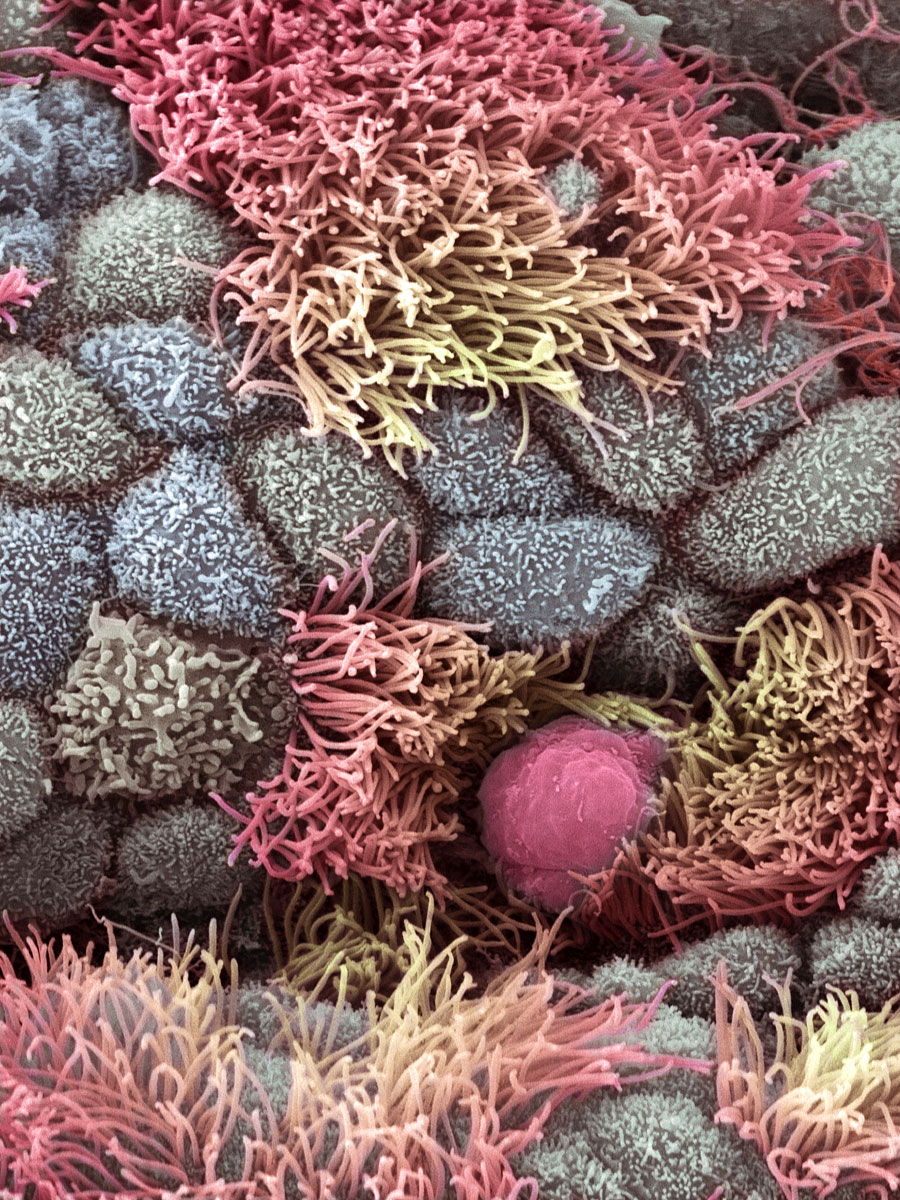Uterine tube, SEM
One of my friends rang me recently with the news: “I’ve been diagnosed with polycystic ovary syndrome.” Twenty years ago, I heard this diagnosis too. On the ultrasound, my ovaries looked like bunches of grapes. However, despite the state of my ovaries, I didn’t have polycystic ovarian syndrome (PCOS) which has distinguishing features like excess weight, hirsutism (increased hair growth on face and other body areas), acne and menstrual cycle irregularities. I was thin, as is my friend, and I had none of the other features of the condition. So what was going on?
It had been a very stressful period in my life and luckily I found an excellent doctor who specialised in nutritional and herbal medicine. When he asked about my exposure to environmental toxins, I realised I‘d spent months painting the inside of the house and I’d also done an art project with a pen containing xylene, a highly toxic chemical that I’d inhaled without realising. My body was in toxic overload and my ovaries were reflecting that state.
It took months of concerted effort – eliminating all environmental chemicals, changing my diet, and modifying my lifestyle – to regain my health and fertility.
As I told this story to my friend, she began joining the dots. While she didn’t have the same chemical exposure, she was a smoker who drank lots of sweet coffee as a way of managing a stressful job that required her to push through to meet the demands. Cigarettes, caffeine and sugar in high doses are all known to produce toxins in the body, and my friend’s adrenals were in chronic over-drive from her stressful job.
Research has shown that competitive behaviour in the workplace can result in increased testosterone in both men and women. Increased androgens (male hormones) are another feature of PCOS. Listening to my friend’s description, I remarked that her symptoms reflected the cost of these combined stressors. I imagined her adrenal glands as red-faced little guys with sweat-bands round their heads! Our bodies are highly sensitive to prolonged stress and fertility is one of the first things to go.

A beautiful colorful coral reef
In the biomedical model, the human body is seen as a kind of flawed machine, a bit like a car only more complicated. In reality, the female body is a wonderfully complex, finely tuned eco-system much more akin to a coral reef. Look at the photo at the top of this blog! It looks like an underwater sea-scape. Yet it’s the inside of the uterine tube at high magnification.
The menstrual cycle is governed by a finely balanced suite of hormones, all interacting with each other and with the entire endocrine system. These female hormones are governed by the pituitary, the master-gland, which is attached to the hypothalamus, a part of the brain considered to be the link between the nervous system and the endocrine system.
When the hypothalamus receives a signal from the nervous system, it secretes neuro-hormones that prompt the secretion of our fertility hormones. If our body is chronically stressed, the hypothalamus interprets this information as not conducive to pregnancy. Animals in the wild won’t reproduce when food is scarce or they’re under threat. Hormonal stress signals from the adrenal glands over-ride the hormonal balance of the menstrual cycle. In this situation, the multiple follicles of polycystic ovaries are like a stress explosion, a warning that our system need down-regulating.
PCOS is reportedly on the rise. So many women unwittingly operate out of a masculine psychology that is linear, left-brain, task-oriented and goal-focussed. This way of being is often the norm in our institutions and work-places. Historically, as more women entered the work place, they adapted to the normal practices of what was once a male-dominated sphere. But at what cost? Behaviours that may work for the male body can wreak havoc in the female body, which is hormonally more complex and cyclic in nature. In the world around us, when the laws of nature are over-ridden, there’s a consequence. So it is with the natural laws inside our bodies.
Many women who come to me as clients wonder why they can’t conceive, why their menstrual cycle is erratic, why they feel so stressed, burnt out and unhappy. They are usually unaware that they’ve internalised a masculine way of being in the world that’s causing them significant physical, emotional and spiritual distress. As a body-worker once put it: the men are men and so are the women!
So, what can be done if you’re told you have PCOS? Here are 3 suggestions:
- Understanding this imbalance can begin the process of realignment. Inside us, we have an inbuilt template for health – but we need to know how to find it. When our bodies are supported to be in harmony with nature, they can often return to a state of wellbeing on their own. As a hypnotherapist, I teach people how to access this inner resource, how to use the power of their mind to realign with the natural laws in their bodies and to regularly down-regulate their nervous system.
- Do an audit of your food, environment and work/life balance. Make an inventory of possible dietary contaminants (foods you’re sensitive to, processed foods with preservatives, high coffee or sugar intake, non-organic veggies or meat, alcohol), environmental toxins (cleaning products, personal hygiene products like deodorant, toothpaste and shampoo, air-fresheners), lifestyle pace and workplace stressors. This will help to identify some of the contributors to the state of your ovaries and enable you to work out what lifestyle changes are needed.
- Sometimes, as in my experience, herbal and nutritional treatments can be really helpful to support your body to come back into its naturally healthy state. They help to eliminate toxins and give your body more of the raw material for the cells to repair. Activated charcoal helps remove toxins. Lots of clean water is essential.
If you have a diagnosis of PCOS, it may not necessarily mean that you have the syndrome. Investigate more deeply. The imbalance in your ovaries may be telling you something important about your life process that you really need to hear. If you want some help to tune in and listen, give me a call. Your body doesn’t lie and it’s a wonderful communicator.

